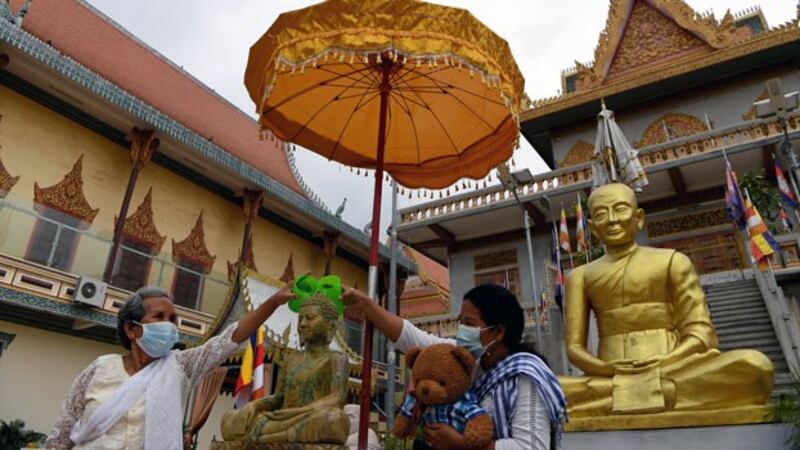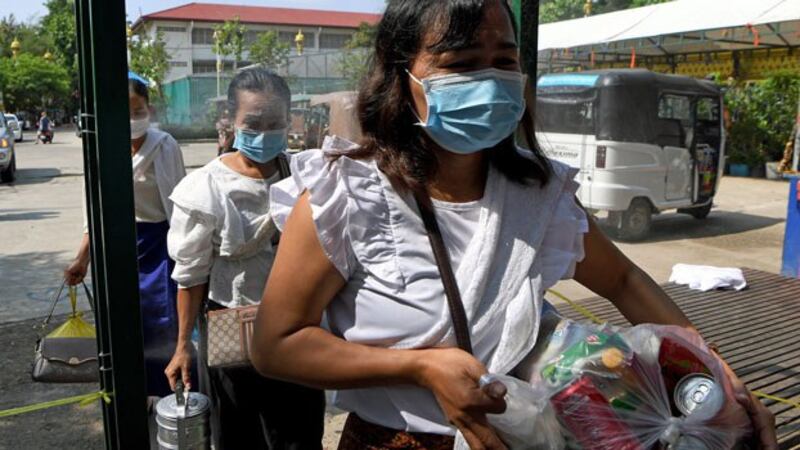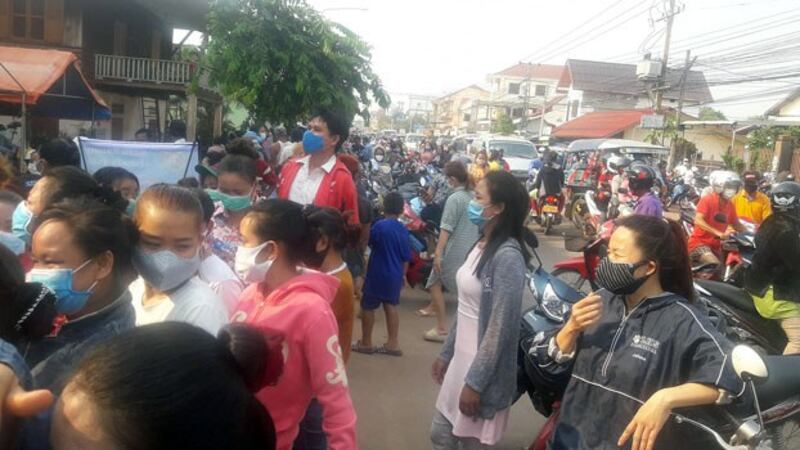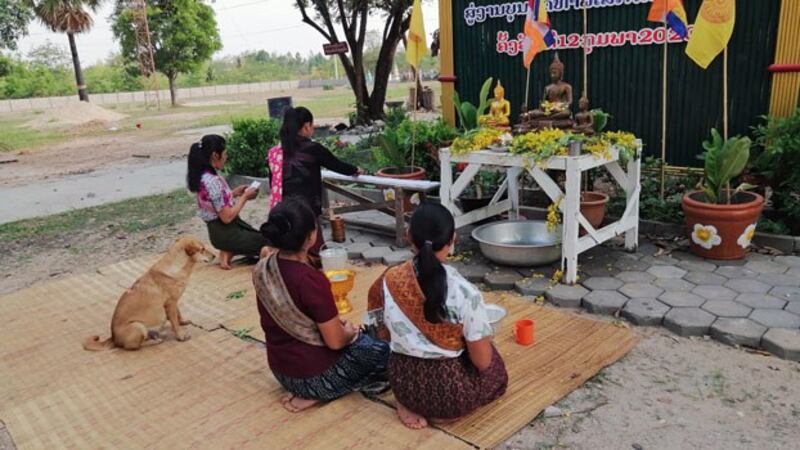The coronavirus pandemic has dried up New Year celebrations in Cambodia, Laos, and Myanmar, a Southeast Asian tradition where people celebrate by dousing each other with water during the hottest time of the year, metaphorically washing away the sins of the past 12 months, with small numbers openly defying lockdown orders.
Government-mandated lockdowns to prevent the spread of the deadly virus, or COVID-19, in all three predominantly Buddhist countries mean revelers must stay inside and forego visits to temples and street festivals during the beloved public holiday.
Myanmar’s Buddhist New Year festival, Thingyan, which officially runs April 13-16 this year, is distinguished by water-throwing during the roughly weeklong public holiday. People in major cities, such as the commercial hub Yangon, use hoses and large syringes made of bamboo and plastic to drench their fellow citizens and visitors.
But the Myanmar government put an early end to that on March 13 when it announced a ban on public gatherings, including during Thingyan, until April 30, saying that the suspension period would be extended as needed.
As of Wednesday, the country registered 74 confirmed coronavirus cases and four fatalities.
Thousands of residents of Sittwe, capital of western Myanmar’s Rakhine state, gathered on a local beach to celebrate the holiday, though authorities announced Tuesday that the area would be closed, community leaders and a local administrator said.
“We announced the closure of the beach, but there are some who failed to follow the order, so we had to physically close it down,” said Ko Ko Lay, secretary of the Sittwe Elders Association.
His association colleague, Than Shwe, added, “We must be able to get through this pandemic successfully, so we have to follow the rules, and everyone’s participation is very important.”
Sittwe district administrator Aung Nyint Oo said officials will take legal action against those who violate restrictions as a last resort.
“At present, we are trying to get people to understand [why this is necessary],” he said.
Security guards have been placed on the beach to enforce the order and to prevent gatherings.
Restaurants in Sittwe have been closed since April 10, forcing residents to celebrate at home.

All quiet in Cambodia
The New Year was quiet in Cambodia, whose official holiday falls on April 14-16 this year, with villagers foregoing traditional visits to Buddhist pagodas, according to people in the capital Phnom Penh and in the provinces.
Most Cambodian are heeding an order issued by Prime Minister Hun Sen to stay at home during the three-day public holiday, which the government has postponed, though several hundred have breached travel restrictions imposed to contain the spread of COVID-19.
Phnom Penh resident Dara Vichhay said the city was quiet, though some people quietly gathered in coffee shops, while a few others were out shopping or trickled into pagodas.
“I did not see many people gathering and drinking too much, but, obviously, some of them still did not listen to the Ministry of Health’s instructions,” he said. “[But] this morning when I went to a pagoda, it was quiet.”
Many workers meanwhile gathered outside their factories and bought food from nearby vendors, Dara Vichhay added.
Besides cancelling this year’s holiday, the government required factory employees to work as usual, with Hun Sen warning of “tough measures” for those who refused to comply with the order.
So far, Cambodia has reported 122 confirmed coronavirus cases, but no fatalities.
Four days before the New Year, the country’s National Assembly passed a law authorizing a state of emergency to contain the spread of the coronavirus.
The law’s provisions include punishment of up to a decade in jail for anyone found guilty of “obstructing authorities” or failing to respect government measures in such a way that causes social unrest or threatens national security.
Phauk Siphin, another resident of the capital, also reported few people in the streets, and said by the third day of the holiday no one was visiting pagodas or bringing food for monks, as is customary.

No Cambodians on beach
People in Cambodia’s provinces were also subdued Wednesday, with police blocking roads to prevent any travel, while some beach resorts in Preah Sihanouk province on the Gulf of Thailand were devoid of visitors unlike during previous New Year holidays.
Kim Sok, owner of a food stall on the province’s O’Chheuteal Beach, said he had not seen many tourists in the area during the past two days and that many other stalls had closed.
“We didn’t see any Cambodian people coming to play on the beach during the Khmer New Year, but some Chinese nationals have come to eat food here,” he said. “Most of them are staying in Sihanoukville, so maybe some of the casinos are closed.”
Kim Sok said he has kept his food stall open because he does not have any other place to go.
Visitors also are staying away from two other places popular with visitors — southwest Cambodia’s Kampot province, whose capital known for its French colonial architecture, and Kep province in the country’s south, known for its seafood and tropical islands.
Kampot resident Heng Soeun said streets in the capital are empty and not many people are buying food in a market that is open. A shop next to Kompong Bay Lake in the provincial town is closed, however.
Some tourists on Wednesday took advantage of the absence of crowds to visit the Angkor complex, a UNESCO World Heritage Site in Siem Reap province, whose Angkor Wat temple is Cambodia’s top tourist attraction.
Siem Reap resident Haing Ron said the visitors are Cambodians from neighboring provinces who are wearing face masks as they walk around the huge complex, and that taxi and mototaxi services have been suspended during the holiday period.
“There are not so many [visitors], just a few more than on ordinary days,” he said. “During the New Year, there have been slightly more than on regular days because they are traveling as families.”
“[But] most shops and restaurants in Siem Reap are closed, and hotels have suspended their operations,” he added.

Food handouts in Vientiane
People stayed at home in neighboring landlocked Laos, whose New Year holiday is observed on April 13-16, in keeping with an existing government-ordered lockdown in effect from April 1-19.
On the final day of the official public holiday period, Prime Minister Thongloun Sisoulith extended the lockdown by 14 days until May 3 and advised people to adhere to the recommendations of a national COVID-19 prevention task force.
As of Wednesday, Laos recorded 19 confirmed COVID-19 cases, but no deaths.
Despite the announcement, more than 1,000 residents of Done Deng village in the Chanthabouly district of the capital Vientiane gathered in a public space on Tuesday to pick up free food donations, including rice, dry noodles, water, and eggs.
“I didn’t go, but I knew that they were distributing the handouts,” said one villager who declined to be named. “Many people commented that only those who had nothing to eat went to the place. It was too crowded and dangerous.”
Another villager expressed concern over people in the crowd not practicing social distancing
“It would have been less risky if the authorities had helped to organize the distribution,” he said, “Distributing donations is good, but the company didn’t think about the gathering. I’m afraid, it was too risky.”
An employee from Sisombath Company, which donated the food and handed it out in 1,400 packages, said he and others distributed the food very quickly in 20 minutes and then asked the people to disperse.
“We were practicing strict measures and receiving help from the authorities,” he said. “Everything was OK.”
The worker, who declined to give his name, said that his company did not have enough supplies for everyone who showed up.
A district police officer said that the company should have given the donations to village authorities to deliver to residents.
Though the company did not receive any violations, its manager, Saleumphon Sounvongsa, apologized to the government for the misstep.

Few Buddhist worshipers
Religious leaders reported seeing few visitors at public temples in Laos during the holiday period.
“Lao New Year activities are all canceled in compliance with an order from the Lao Buddhist Fellowship Organization of the Lao PDR [People’s Democratic Republic],” an abbot at a temple in Songkhone district of Savannakhet province said Tuesday.
“The Buddha statues are briefly on display and watered only by a few worshipers according to tradition, but celebrations are not allowed,” he added.
During the Lao New Year, people use water to wash Buddha images, homes, and monks, and to soak their friends and passersby.
“This year is not like previous years,” said a Buddhist follower in Vientiane. There are no celebrations and no big ceremonies. The monks don’t want to have contact with the public because of the coronavirus scare.”
A few people in the ancient capital of Luang Prabang in northern Laos celebrated quietly by watering Buddha statues at various temples.
“Watering Buddhas is allowed, but gatherings are not,” a monk in the city said Wednesday .
A Luang Prabang-based official from the Lao Front for National Construction, which oversees sociopolitical organizations, said, “This year we’ve had no processions, no Prabang [big Buddha statue] waterings, and no alms collections.”
Reported by Min Thein Aung for RFA’s Myanmar Service, RFA’s Khmer Service, and RFA’s Lao Service. Translated by Maung Maung Ny, Aun Pheap, and Max Avary. Written in English by Roseanne Gerin.
